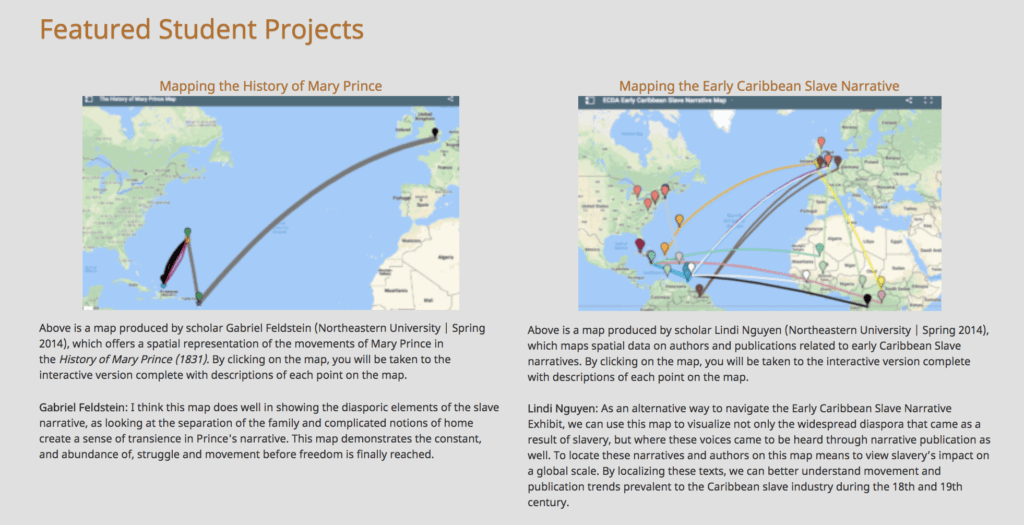By Sarah Payne
As a NULab Fellow during the 2017-2018 academic year, I devoted a portion of my hours each week to working with the Early Caribbean Digital Archive (ECDA). I was initially drawn to the ECDA for a variety of reasons. As a PhD candidate in literature, my dissertation includes a significant amount of attention to twentieth century Caribbean literature. I felt my knowledge of the Caribbean before the twentieth century, however, was lacking, both in terms of history and literature. Working with the ECDA has supplemented my knowledge of the Caribbean in a more hands-on, organic way than just reading books about the region would have. By collaborating on this project, I’ve gained a greater understanding of the early Caribbean as well as how the region has typically been represented in archives in ways that reinforce racist and colonialist power structures.

Some of my favorite moments from working with the ECDA were the conversations that occurred during our weekly meetings in which Nicole N. Aljoe, Elizabeth Maddock Dillon, Liz Polcha, Alanna Prince, and myself would discuss issues of representation. We had thought-provoking discussions about how to configure our metadata for archival items in ways that worked against the racism and sexism embedded in texts written by white colonizers. For example, many colonial texts depict enslaved persons using stereotypical and denigrating language. We asked ourselves if we should use “warrior” as opposed to “slave” to represent slaves who rebelled against their oppressors. As someone who provides technical trainings for exhibit building tools such as CERES and Omeka, these conversations made me more conscious of the ways digital archives are not neutral, apolitical representations of some historical truth, but carefully curated spaces that involve highly political discussions. Being involved in these discussions has made me want to shift my technical trainings to reflect more of the decision making and questions of representation that go into an online exhibit or archive.
I was also drawn to the collaborative aspect of the ECDA. Not only did I work with several other Northeastern professors and graduate students this year, but I was also able to participate in discussions with professors and projects not housed at Northeastern. For example, the ECDA met with Sarah Lynn Patterson and Jim Casey of the Colored Conventions Project during which we had a stimulating conversation regarding exhibit building, questions of metadata, and how to make sure digital projects ethically reflect recuperative motivations. The ECDA team also met with Sharon Leon from Michigan State University who is currently working on a digital project about Jesuit-owned slaves in 19th century Maryland. Leon was able to provide valuable insight regarding audience awareness and how to structure the ECDA’s site to include non-academic viewers. Much of my dissertation work involves reading and writing by myself, so it was refreshing and enriching to work so closely with a variety of people who are not only of various institutional ranks, but also of various disciplinary backgrounds. Working with the ECDA has afforded me greater appreciation of collaborative work as well as enabled me to forge connections outside of my discipline and outside of Northeastern that I otherwise might not have made.
Finally, the ECDA has helped me continue to develop my interest in digital pedagogy. While I was responsible for designing the technical framework of the classroom page, I was always more interested in our discussions of the content that populated the classroom page. Through editing assignment sheets and in-class activities that incorporate the ECDA, and deciding which of the classroom materials were exemplary, I gained a greater understanding of how to structure digital assignments for undergraduates as well as what constitutes a successful digital project. My work with the ECDA has made me excited to incorporate digital assignments into an undergraduate classroom and more attuned to the pedagogical questions that surface with digital assignments. I plan to keep working for the ECDA this summer as I continue to add content to the classroom page and fine-tune some of the more technical aspects. We also plan to use the summer to lead an exhibit building workshop at the Caribbean Studies Association conference and start drafting an article for publication.



